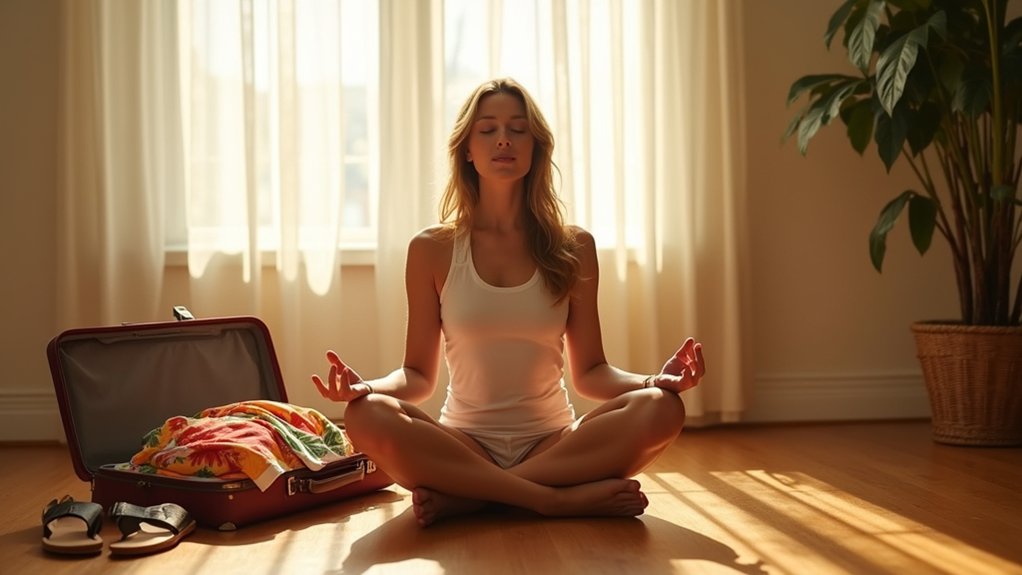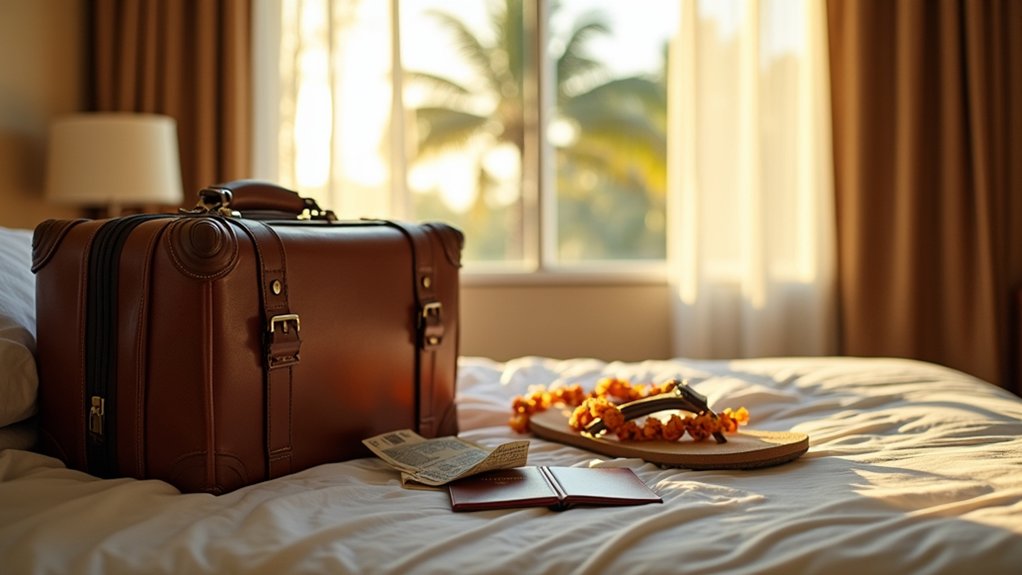You’ve probably heard that post-vacation blues are just “all in your head,” but research actually shows they’re a legitimate psychological phenomenon affecting your brain chemistry and stress hormones. The abrupt shift from vacation’s dopamine-rich experiences back to routine responsibilities creates a real emotional crash that can last weeks if left unaddressed. Fortunately, there are seven scientifically-backed strategies that can help you reclaim that vacation glow and transform your return home into something surprisingly manageable.
Key Points
- Practice mindfulness and meditation to sustain emotional well-being for up to 10 weeks after vacation.
- Maintain regular exercise to trigger endorphin release and regulate stress hormones like cortisol effectively.
- Incorporate vacation elements like hobbies and rituals into daily life to create ongoing joy.
- Establish proper sleep hygiene with gradual bedtime adjustments and morning light exposure for circadian rhythm reset.
- Negotiate workplace flexibility like staggered start times or hybrid work options to ease transition stress.
Practice Mindfulness and Meditation to Ease the Transition

Although returning from vacation often feels like crashing back to reality, practicing mindfulness and meditation can transform this jarring changeover into a gentler emotional landing.
Research shows that meditation during vacations produces sustained emotional well-being for up to 10 weeks afterward, while reducing post-vacation fatigue compared to trips without mindful practices.
Vacation meditation extends emotional benefits for 10 weeks while significantly reducing the fatigue that typically follows mindful-free trips.
You don’t need intensive retreat experience—even occasional meditation yields comparable positive outcomes. Regular vacation benefits typically decline rapidly within 1-3 weeks of returning home.
Digital meditation tools demonstrate an average 23.5% reduction in perceived stress, particularly when you practice four times weekly.
Mindfulness helps you acknowledge difficult emotions like nostalgia or irritability without suppressing them, preventing excessive rumination about your amazing getaway.
Maintain Your Exercise Routine to Boost Energy and Mood
When your vacation energy starts fading faster than your tan, maintaining your exercise routine becomes one of your most powerful weapons against the post-vacation blues. Physical activity triggers endorphin release, those natural brain chemicals that create the euphoric “runner’s high” and counteract your post-holiday mood dip.
You’ll discover that regular workouts help regulate stress hormones like cortisol while improving sleep quality—crucial for correcting those disrupted vacation sleep cycles. Moderate workouts can function like sleeping pills, helping restore your natural sleep patterns.
Exercise also sharpens cognitive function and concentration, making your shift back to work less jarring. Consider joining group fitness classes or finding an exercise buddy; the social interaction amplifies mood benefits while keeping you accountable.
Start with manageable goals to avoid overwhelm, and remember that even moderate activity can greatly reduce anxiety levels and boost your confidence as you readjust to routine.
Incorporate Vacation Elements Into Your Daily Life

You don’t have to abandon that watercolor painting hobby you discovered in Tuscany or give up the sunrise yoga routine that made you feel so energized in Bali.
By weaving these vacation discoveries into your regular schedule, you’ll create daily pockets of joy that remind you why life felt so lively during your time away.
Whether it’s maintaining that afternoon tea ritual you loved in London or continuing the evening walks that cleared your mind on the beach, these small but meaningful practices can transform ordinary weekdays into something that feels a little more like paradise. Consider planning your next adventure to places that offer unique travel experiences, which can provide fresh inspiration for new habits and hobbies to incorporate into your routine. Research shows that movement behaviors naturally change during vacation periods, so consciously maintaining positive physical activities from your travels can help sustain the wellness benefits you experienced while away.
Continue Vacation Hobbies
One of the most effective strategies for beating post-vacation blues involves weaving the activities, experiences, and discoveries from your trip directly into your everyday routine.
Whether you learned to paint watercolors in Tuscany or discovered a passion for salsa dancing in Barcelona, these newfound interests shouldn’t collect dust like forgotten souvenirs.
Schedule regular sessions to practice that foreign language you picked up, cook those exotic dishes you savored, or continue the photography hobby that captured stunning sunsets.
Research shows that 27% of travelers experience post-vacation blues, but consistently engaging with vacation hobbies greatly reduces these symptoms while boosting motivation. This approach helps combat the lack of motivation that affects 27% of people returning from vacation, making the transition back to everyday life much smoother.
Set calendar reminders and share these activities with friends—cooking that Thai curry together beats scrolling through vacation photos alone, and it’ll keep those positive travel vibes alive.
Maintain Travel Routines
Since vacation routines often create a healthier rhythm than our regular lives, carrying these patterns forward becomes your secret weapon against post-vacation depression.
Your vacation sleep schedule likely added precious minutes to your nightly rest—maintain that extra 7-8 minutes daily for two weeks to ease your adjustment back to reality.
Those leisurely morning walks or evening stretches you enjoyed? Schedule them into your regular week as non-negotiable appointments with yourself.
Transform your workplace by incorporating relaxation breaks that mirror your vacation downtime.
Whether it’s a dedicated lunch break for actual relaxation or blocking off low-effort evening time, these buffers help maintain that vacation mindset. Planning enjoyable activities like visiting a museum or scheduling a relaxing day helps combat the fade-out effects that naturally occur after returning from vacation.
Don’t forget the nutrition habits either—keep up that increased water intake and balanced eating patterns that supported your energy levels while traveling.
Prioritize Sleep Hygiene and Gradual Schedule Adjustment
When your vacation officially ends and reality comes knocking, your sleep schedule often bears the brunt of the change, leaving you groggy, irritable, and emotionally vulnerable to those dreaded post-vacation blues.
Poor sleep quality triples your risk of reporting poor mental health, while inadequate sleep increases mental distress odds by 2.5 times.
Start adjusting your bedtime gradually several days before vacation ends, shifting by 15-30 minutes daily. Create a screen-free hour before bed, limit afternoon caffeine, and establish a relaxing pre-sleep routine like reading or meditation.
Use morning light exposure to reset your circadian rhythm, but resist excessive daytime napping that’ll sabotage nighttime sleep. Remember that one-third of adults already sleep less than the recommended seven hours nightly, so prioritizing adequate rest becomes even more crucial during this transition period.
Quality sleep regulates mood-stabilizing neurotransmitters and reduces those withdrawal-like effects from vacation’s dopamine highs, helping you bounce back emotionally stronger.
Request Flexible Work Arrangements During Re-entry

Although your first instinct might be to power through that jarring return to rigid schedules, requesting flexible work arrangements during your vacation re-entry can transform a potentially brutal change into a manageable, gradual adjustment.
Transform your brutal post-vacation transition into a manageable adjustment by requesting flexible work arrangements instead of powering through rigid schedules.
You’re not alone in valuing this flexibility—94% of knowledge workers crave schedule flexibility, and research shows a strong positive correlation between flexible arrangements and reduced job stress.
Consider these strategic approaches for your re-entry:
- Negotiate staggered start times to ease morning changes and allow mental preparation.
- Request hybrid work options to blend home comfort with office productivity during adjustment.
- Propose compressed workweeks to maintain longer recovery periods between intense work days.
With 57% of workers already enjoying flexible schedules, you’re making a reasonable request that benefits both your well-being and performance. However, it’s important to understand that union representation significantly increases your likelihood of securing these flexible arrangements and schedule certainty.
Address Financial Stress Through Planning and Budgeting
Beyond the logistics of returning to work, vacation’s financial aftermath often creates its own flavor of stress that can intensify those post-trip blues.
Start by reviewing all your vacation expenses to understand exactly where you stand financially—those “just this once” purchases add up faster than you’d think.
Create a realistic repayment plan for any vacation debt, breaking it into manageable monthly chunks that won’t leave you eating ramen until next summer.
Develop a short-term budget focused on essentials while temporarily scaling back discretionary spending.
Remember that you’re not alone in this struggle—financial challenges are commonly discussed in therapy sessions, indicating just how widespread these post-spending concerns really are.
Most importantly, use this experience to plan future vacations with clear financial boundaries.
Research costs beforehand, set firm spending limits, and remember that the best memories don’t always require the biggest price tags.
Recognize When Professional Support May Be Needed

While returning from vacation naturally brings some melancholy, there’s an important distinction between normal post-trip adjustment and symptoms that signal you might need professional support.
Post-vacation sadness is normal, but prolonged symptoms affecting your daily life may require professional intervention.
Post-vacation blues typically fade within a few days, but persistent sadness lasting beyond two weeks warrants attention. If you’re struggling with daily functioning, missing work, or experiencing strained relationships, it’s time to reflect on professional help.
Watch for these warning signs that indicate you need support:
- Persistent symptoms – Depression, anxiety, or disorientation that doesn’t improve after two weeks
- Impaired daily functioning – Difficulty maintaining personal hygiene, completing tasks, or managing responsibilities
- Physical manifestations – Insomnia, fatigue, appetite changes, or other unexplained physical symptoms
Licensed therapists, Employee Assistance Programs, and online therapy platforms offer accessible resources to help you navigate these challenging changes effectively. Research demonstrates that online therapy provides significant reductions in depression symptoms and can be just as beneficial as traditional in-person therapy for addressing post-vacation emotional challenges.
The Last Word
Think of post-vacation blues as a ship returning to harbor after sailing open seas. You’re the captain steering through choppy waters between vacation memories and daily reality. By practicing mindfulness, maintaining exercise routines, and incorporating vacation joy into everyday life, you’ll steady your vessel. Don’t hesitate to adjust your sails through flexible work arrangements or seek a lighthouse keeper’s guidance when storms feel overwhelming. Smooth sailing awaits ahead.

